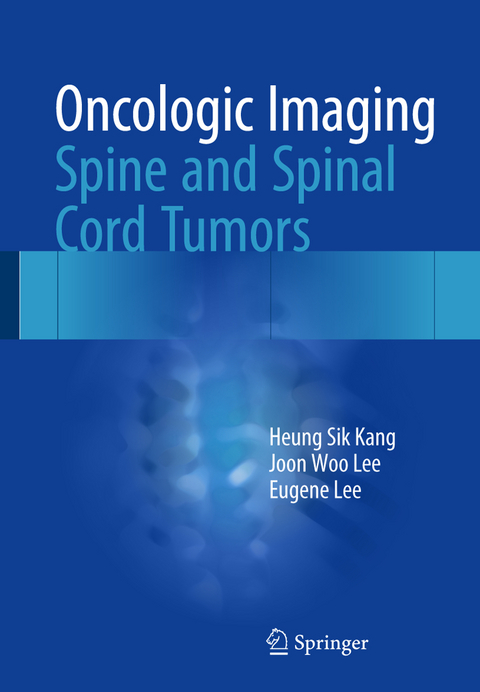
Oncologic Imaging: Spine and Spinal Cord Tumors
Springer Verlag, Singapore
978-981-287-699-7 (ISBN)
Heung Sik Kang, Department of Radiology, Seoul National University College of Medicine, Seoul National University Bundang Hospital, Seoul, Republic of Korea Joon Woo Lee, Department of Radiology, Seoul National University College of Medicine, Seoul National University Bundang Hospital, Seoul, Republic of Korea Eugene Lee, Department of Radiology, Seoul National University College of Medicine, Seoul National University Bundang Hospital, Seoul, Republic of Korea
I. Warm-up: Basic Concepts.- 1. Compartmental approach to spinal tumors.- 1) Intraosseous / extradural / intraduralextramedullary / intramedullary.- 2) Extradural versus intradural tumors.- 3) Intraduralextramedullary versus intramedullary tumors.- 2. Histologic basis of imaging appearances for spinal tumors.- 1) Tumors with fatty component.- 2) Red marrow component.- 3) Tumors with vascular component.- 4) High-cellularity tumors.- 5) Tumors with hemorrhagic component.- 6) Tumors with myxoid component.- 7) Tumors with calcification/ossification.- 8) Tumors with cystic degeneration/necrosis.- 9) Slow growing tumors.- 10) Locally aggressive tumors.- 11) Small round cell tumors.- II. Training: Tumor details.- 1. Bone tumors.- 1) Benign bone tumors.- 2) Malignant bone tumors.- 3) Bone tumor mimics.- 2. Extradural non-osseous tumors.- 1) Benign extradural tumors.- 2) Malignant extradural tumors.- 3) Extradural tumor mimics.- 3. Intraduralextramedullary tumors.- 1) Benign intraduralextramedullary tumors.- 2) Malignant intraduralextramedullary tumors.- 3) Intradural tumor mimics.- 4. Intramedullary tumors.- 1) Benign intramedullary tumors.- 2) Malignant intramedullary tumors.- 3) Intramedullary tumor mimics.- III. Practice: Tips for the correct diagnosis.- 1. Bone tumors.- 1) Incidence-based approach for spinal bone tumors.- 2) Age-based approach for spinal bone tumors.- 3) Location based approach for spinal bone tumors.- 4) Imaging pattern based approach for spinal bone tumors.- (1) Benign appearing osseous lesions.- (2) Sclerotic lesions of the vertebra.- (3) Multi-compartmental lesions.- (4) Relation with cortex.- (5)Common tumors with diffuse spine involvement.- 2. Extradural tumors.- 1) Incidence-based approach for extradural tumors.- 2) Age-based approach for extradural tumors.- 3) Location based approach for extradural tumors.- 4) Imaging pattern based approach for extradural tumors.- (1) Cystic tumors.- (2) Tumors with lobular contours.- (3) Tumors with hemorrhage.- (4) Different enhancement patterns,- 5)Tumors versus Herniated disc.- 3. Intraduralextramedullary (IDEM) tumors.- 1) Incidence-based approach for IDEM tumors.- 2) Age-based approach for IDEM tumors.- 3) Location based approach for IDEM tumors.- 4) Imaging pattern based approach for IDEM tumors.- (1) Tumors with high-cellularity.- (2) Tumors with intra-lesional calcifications.- (3) Hypervascular tumors with AV shunt or superficial siderosis.- (4) Tumors near conusmedullaris or caudaequina.- (5) Multiple IDEM tumors.- 4. Intramedullary (IM) tumors.- 1) Incidence-based approach of IM tumors.- 2) Age-based approach for IM tumors.- 3) Location based approach for IM tumors.- 4) Imaging pattern based approach for IM tumors.- (1) Tumors with cystic change.- (2) Tumors with hemorrhage.- (3) Tumors with surrounding extensive cord edema.- (4) Multiple IM tumors.- 5) IM tumors versus non-tumorous myelopathy.- 5. Infant/childhood spinal tumors.- 1) Bone tumors.- 2) Intraduralextramedullary tumors.- 3) Intramedullary tumors.- 4) Relation with other syndromes.
| Zusatzinfo | 150 Illustrations, color; 8 Illustrations, black and white; XIV, 248 p. 158 illus., 150 illus. in color. |
|---|---|
| Verlagsort | Singapore |
| Sprache | englisch |
| Maße | 178 x 254 mm |
| Themenwelt | Medizin / Pharmazie ► Medizinische Fachgebiete ► Onkologie |
| Medizinische Fachgebiete ► Radiologie / Bildgebende Verfahren ► Radiologie | |
| Medizin / Pharmazie ► Studium ► 1. Studienabschnitt (Vorklinik) | |
| Studium ► 2. Studienabschnitt (Klinik) ► Pathologie | |
| Naturwissenschaften ► Biologie ► Biochemie | |
| Schlagworte | Compartmental approach • Imaging appearance • Imaging diagnosis • Spinal tumor • Tumor patterns |
| ISBN-10 | 981-287-699-5 / 9812876995 |
| ISBN-13 | 978-981-287-699-7 / 9789812876997 |
| Zustand | Neuware |
| Informationen gemäß Produktsicherheitsverordnung (GPSR) | |
| Haben Sie eine Frage zum Produkt? |
aus dem Bereich


